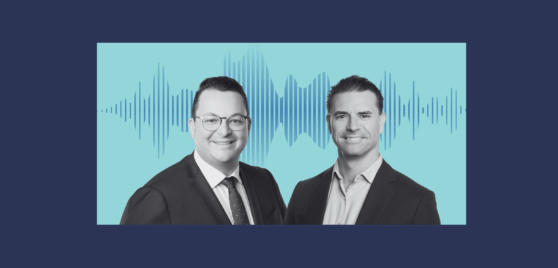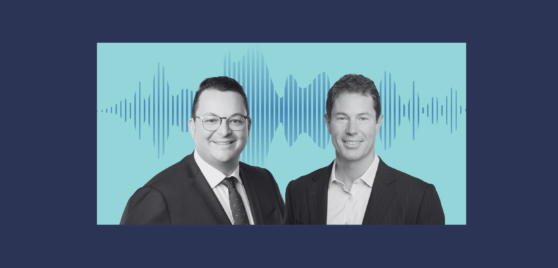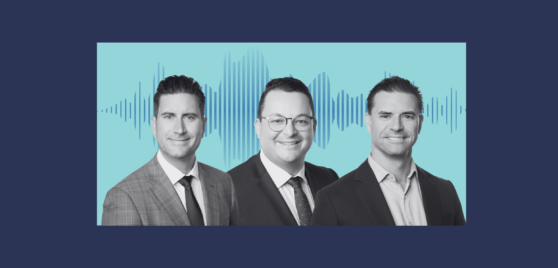Featuring Hugh Giddy
LISTEN
READ
Senior Portfolio Manager Hugh Giddy discusses the performance of IML’s large cap funds for financial year 2024, as well as key stocks and market movements.
Follow our podcast, ‘Navigating the Noise’ on Spotify, Apple or Amazon to be notified of new episodes.
 |
 |
 |
Lightly edited transcript
Jason Guthrie: Hello, and welcome to Navigating the Noise, a podcast by Natixis Investment Managers Australia, where we bring you insights from our global collective of experts to help you make better investment decisions. I’m Jason Guthrie, Head of Wholesale, and today, I’m joined by Hugh Giddy who is Senior Portfolio Manager and Head of Research at IML, providing his regular quarterly update on the large-cap strategies at the firm.
Now Hugh has been with IML for almost 15 years, having previously managed capital on behalf of clients at his own firm, Cannae Capital, and other well-regarded managers including Perennial, Macquarie, and Orbis, and always brings plenty of personality and flavour to these regular updates. The rough agenda will include a market update for the quarter, how the funds have performed, some of the more recent opportunities in the portfolios, and the outlook from here. Please enjoy the conversation.
Hugh, welcome to the podcast.
Hugh Giddy: Thank you, Jason.
Jason: So, Hugh, the end of the final quarter and financial year. Hard to believe another 12 months done. It’s been another strong quarter on global indices. Not so much here in Australia. I think the ASX 300 was down around 1.2% for the quarter. What were the main things that you saw during the period?
Hugh: We were doing quite well as a market. Australia was going along quite well. We hit a new high in the benchmark in May. At the end of May, out came the inflation figure. And Australian inflation hasn’t been trending down like overseas inflation has. And if anyone was still holding onto the idea we’re going to get lots of interest rate cuts this year, that certainly put paid to that. If anything, we might get an interest rate rise in August because our inflation hasn’t come down. Almost every other country, the trend of inflation has been down. What we’ve also seen is a lot of companies in the retail sector have been pointing to slower sales. Now, we hear about cost-of-living pressures and that’s starting to bite on the consumer. The consumer had a lot of savings accumulated during Covid and they spent a lot in Covid and have maintained that very high spending level. But obviously, things are starting to bite a little bit. If anything, that might hold the Reserve Bank off from an increase, but I think that the inflation figure is quite disturbing.
Jason: Okay. And looking at the specific performance on the large-cap funds that you manage, it’s obviously been a more challenging period, particularly the last 12 months. What were some of the key drivers over that period to that performance?
Hugh: I think active managers have been having a tough time around most of the world because the market rally has been quite narrow. Very large-caps have been outperforming mid and small-caps for quite some time. In the US, you have this famous Magnificent 7, which consists of, well-known big tech companies like Nvidia, Amazon, Apple, Microsoft, and they have driven most of the return in the US. In Australia, what’s really been driving the markets, and I think most fund managers are scratching their heads, obviously not all, is the banks, which constitute a very large part of our market. And the earnings of the banks are making no progress at all. They’re actually shrinking. And yet our banks have gone up about 30%, which has taken them from being expensive compared to banks around the world, to very expensive compared to banks around the world. Even though banks elsewhere around the world like JPMorgan Chase, I think the world’s biggest bank, is at a record, it’s at a much lower valuation, for example, than Commonwealth Bank.
So our banks have hurt a lot of active managers with their strong run, but also the narrowness of the market concentrated in themes like artificial intelligence, which is obviously transformational, but so has the internet been, but a lot of the people who got excited about every company that was involved in the internet in 2000, most people lost money because not every company actually monetised that opportunity the way a few companies did. In Australia, we’ve got a couple of companies that have done very well because they’re seen as artificial intelligence beneficiaries, Goodman Group, for example, because they’re going to build some data centres and NextDC which owns and will build some data centres, but you can buy similar companies elsewhere for much cheaper valuations than those two, for example. So it has been a testing time because of this narrowness. And the level of speculation is quite high.
We are a conservative defensive manager and I couldn’t believe reading that last week, which is the first week of July, just in the first five trading days of the new month or the new financial year for Australia, the Magnificent 7 rose a lazy 7% in a week. Now, that’s more akin to an annual return. There’s obviously just a lot of people suffering FOMO. They don’t want to miss out. This is the part of the market that has been going up, so people are just pouring money into it regardless of what they’re paying. We pay very careful attention to the quality of the companies we invest in and the price we pay. So, it’s tougher to outperform when people aren’t paying attention to the price they’re paying.
Jason: Great. Thanks, Hugh. And what about some of the positive names in the portfolio that’ve produced for the funds?
Hugh: Well, we’ve been very pleased, actually, with the fundamental performance of most of our companies. They’ve been delivering good earnings increases, they’re in strong balance sheet positions, and so on. That’s why we invest in them. They’re quality companies that are able to do well in times such as now where you’ve got the problem of higher costs with inflation and so forth. But singling out a couple, Suncorp’s done very well, that’s been an improving insurance market. Unfortunately, our listeners probably also know they probably had to pay through the nose when they renewed their insurance. Both home and motor insurance premiums have gone up a lot.
Jason: Has the ANZ deal been finalised then?
Hugh: And the ANZ deal has been approved by all parties and Suncorp will be returning some of that money to shareholders. So Suncorp has done well. The other one I’d single out is Orica, which is a global leader in explosives. They have been able to raise prices and they’re also making money from a suite of digital offers that make miners achieve lower costs and greater efficiency in their mining operations. No business is not going to enjoy paying less and getting more efficiency, because of what Orica’s products can deliver. And we think there’s still a fair amount of runway in that company.
Jason: What about on the negative? Is there any particular names you want to touch on? Not everything goes to plan?
Hugh: With our underperformance, obviously, there were some negatives. The one that we’re scratching our hair about is Telstra. Telstra is one we know well, but we’ve increased our position as we thought that the industry dynamics were improving. It’s a low-returning industry. Optus and Vodafone are barely profitable in the mobile segment and we thought price rises were necessary. And for some time, Optus was keeping prices low, but all companies have been increasing prices. But this year, Telstra just said, “We’re not going to lift prices by CPI anymore.” They didn’t say, “We’re not going to lift prices.” And the market took that very negatively and sold it off. We know that they are still going to increase prices, they need to. Recently, we’ve seen Optus lift prices. Just over the weekend, JB Hi-Fi, who resells Telstra’s mobile service, has lifted prices.
And then we think the infrastructure division, which owns the NBN payments and the mobile phone towers, that is underappreciated. That’s a very solid asset. And also, those NBN payments are CPI-linked. So if inflation is up, Telstra’s making more money.
The second stock I’d single out is Tabcorp, which has had a rough run. What we are waiting for is the final state to agree on a level playing field, which is New South Wales. New South Wales has announced that they are investigating because Tabcorp has been facing competition from people who operate out of the Northern Territory and hardly pay a licence fee and they pay a big licence fee and pay significant taxes to the states to operate a wagering business and they shouldn’t be hamstrung by competing with people who are operating in the same country in a regulated industry, but don’t pay the same taxes and so forth.
So we will see equalisation. It will happen, we just don’t know when. It’s already happened in Queensland. Tabcorp’s making decent money in Queensland. It’s going to happen in Victoria with the new license that Tabcorp is receiving. Then all the rules become more fair. And it will happen in New South Wales, it won’t be the outlier.
Jason: A bit of rotation of capital moving up to cyclicals?
Hugh: Well, sometimes the solid stocks we own are probably being sold because people were excited about the possibility of interest rate cuts. It doesn’t look like those are going to happen anytime soon unless the economy weakens significantly. And also, people wanted to sell our kind of stocks for the excitement of, “Oh, this stock says they’re going to use artificial intelligence. That’s the future.” Normally, when something’s suddenly a very hot theme, it doesn’t really provide a large number of money-making opportunities. Normally, only one or two winners emerge, even though people back all the horses in the race.
Jason: Sure. And how about trading on the portfolios over the more recent period? Has there been some new names? I think one people may not know too much about is Light & Wonder. The other one is Sigma.
Hugh: Light & Wonder is comparable to Aristocrat, they have a number of divisions, but basically, it’s sort of gaming machines, poker machines in Australia. And they have designed some new games that have been very successful, taking a lot of share partly from Aristocrat but more from the other players in the industry. They also offer some online tools for gaming and so forth. It’s not a large position, but so far it’s going quite well and we think the management’s doing a great job there. The other new position is Sigma, which we expect to become Chemist Warehouse. Chemist Warehouse is by far the bigger part of the business. And Chemist Warehouse, I think, will be familiar to everybody.
If you want to get a cheap bottle of shampoo, deodorant, a protein bar, a fragrance, or get a cheap prescription, Chemist Warehouse is your answer. They do have pharmacists working for them. It’s a franchise network and they have a philosophy of offering very good prices and they have the scale to be able to get good deals from suppliers. They’re taking share from Woolworths and Coles. People used to buy things like toothpaste at the supermarket. I think they would buy them from the chemist, but the chemist prices were quite high. Chemist Warehouse has gone in and not only are they cheaper than the other chemists, they’re cheaper than Woolworths and Coles.
Jason: I buy all my toothpaste there.
Hugh: You’ve got very shiny teeth, Jase.
Jason: It’s the Bunnings of pharmacies and health products.
Well, we might wrap up there. Thank you, Hugh. It’s great to see you again. We appreciate the insights and thank you, of course, to all of our listeners for joining in today. If you enjoyed the episode, please don’t forget to click follow. You can also find the bell icon to be notified of future episodes. And please tune in again very soon to hear more from our global collective of experts.
Disclaimer
This podcast has been prepared and distributed by Natixis Investment Managers Australia Proprietary Limited, ABN 60 088 786 289, AFSL 246830 and includes information provided by third parties, including Investors Mutual Limited (“IML”) AFSL 229988, the responsible entity and investment manager for the IML Funds.
Although Natixis Investment Managers Australia believes that the material in this podcast is correct, no warranty of accuracy, reliability, or completeness is given, including for information provided by third parties except for liability under statute which cannot be excluded. This material is not personal advice. The material is for general information only and does not take into account your personal objectives, financial situation or needs. You should consider and consult with your professional advisor whether the information is suitable for your circumstances. The opinions expressed in the materials are those are the speakers and may not necessarily be those of Natixis Investment Managers Australia or its affiliate investment managers. Before deciding to acquire or continue to hold an investment in a fund, you should consider the information contained in the product disclosure statement in conjunction with the target market determination, TMD, available at www.stg-imlimited-staging.kinsta.cloud.
Past investment performance is not a reliable indicator of future investment performance and no guarantee of performance, return of capital, or a particular rate of return is provided. Any mention of specific company names, securities or asset classes is strictly for informational purposes only and should not be taken as a recommendation to buy, hold, or sell. Any commentary about specific securities is within the context of the investment strategy for the given portfolio. The material may not be reproduced, distributed, or published in whole or in part without the prior written consent of Natixis Investment Managers Australia. Copyright 2024 Natixis investment Managers Australia. All rights reserved.
INVESTMENT INSIGHTS & PERFORMANCE UPDATES
Subscribe to receive IML’s regular performance updates, invitations to webinars as well as regular insights from IML’s investment team, featured in the Natixis Investment Managers Expert Collective newsletter.
IML marketing in Australia is distributed by Natixis Investment Managers, a related entity. Your subscriber details are being collected by Natixis Investment Managers Australia, on behalf of IML. Please refer to our Privacy Policy. Natixis Investment Managers Australia Pty Limited (ABN 60 088 786 289) (AFSL No. 246830) is authorised to provide financial services to wholesale clients and to provide only general financial product advice to retail clients.






